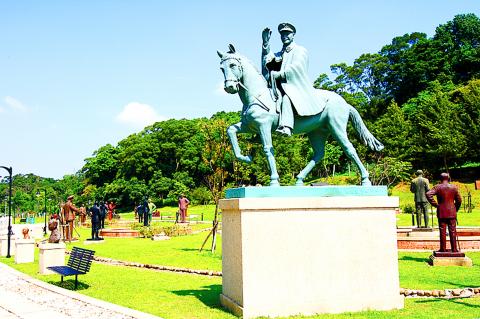The Executive Yuan is to immediately establish an ad hoc commission for the promotion of transitional justice to disclose historical data and remove authoritarian symbols, Premier William Lai (賴清德) said yesterday.
The Legislative Yuan on Tuesday approved the Act on Promoting Transitional Justice (促進轉型正義條例) and Lai yesterday instructed Minister Without Portfolio Lo Ping-cheng (羅秉成) to establish such a committee by nominating a list of members, drafting the organizational regulations and planning a budget.
“The establishment has to be completed in the shortest time possible to meet public expectations for transitional justice and reconciliation,” Lai said.

Photo: CNA
The passage of the act is a milestone in the nation’s democracy and has pivotal importance in the nation’s history, he said.
The committee would be responsible for making political archives available, removing authoritarian symbols, redressing judicial injustice and investigating political persecution, Lai said.
Asked if roads and schools named after former president Chiang Kai-shek (蔣介石) would be renamed, and coins and notes bearing his portraits recalled following the act’s passage, Lai said the committee would have sole discretion.
“It will be fully authorized to make investigations, file reports and make [decisions],” Lai said.
Before the committee is established, it is premature to comment on the treatment of symbols of Chiang, he said.
Executive Yuan spokesman Hsu Kuo-yung (徐國勇) said the establishment of the committee would not be as swift as was the case with the Ill-gotten Party Assets Settlement Committee, because its members did not need to be approved by the Legislative Yuan while transitional justice committee nominees do.
Meanwhile, the Presidential Office said it is illogical to debate whether roads and schools should be renamed until the truth about the nation’s history is understood.
Following the passage of the act, some people have deliberately misinterpreted it and spread misinformation that the government is planning to redesign the nation’s currency, and rename roads and schools, the office said.
Presidential Office spokesman Alex Huang (黃重諺) said there are multiple ways to remove authoritarian symbols, including simple removal and renaming as well as preservation and reconstruction.
The act requires the government to investigate improper criminal proceedings and human rights violations during the authoritarian era and to reinstate the rights and reputations of victims of political persecution, Huang said.
That work would be undertaken by the transitional justice committee, Huang said.
“There should be a list of priorities. Before the investigation of historical truth is completed, before the responsibilities for improper criminal proceedings and human rights violations are ascertained, how can any measures [such as renaming schools] be put forward?” he said.

ACTION PLAN: Taiwan would expand procurement from the US and encourage more companies to invest in the US to deepen bilateral cooperation, Lai said The government would not impose reciprocal tariffs in retaliation against US levies, President William Lai (賴清德) said yesterday, as he announced five strategies to address the issue, including pledging to increase Taiwanese companies’ investments in the US. Lai has in the past few days met with administrative and national security officials, as well as representatives from various industries, to explore countermeasures after US President Donald Trump on Wednesday last week announced a 32 percent duty on Taiwanese imports. In a video released yesterday evening, Lai said that Taiwan would not retaliate against the US with higher tariffs and Taiwanese companies’ commitments to

Intelligence agents have recorded 510,000 instances of “controversial information” being spread online by the Chinese Communist Party (CCP) so far this year, the National Security Bureau (NSB) said in a report yesterday, as it warned of artificial intelligence (AI) being employed to generate destabilizing misinformation. The bureau submitted a written report to the Legislative Yuan in preparation for National Security Bureau Director-General Tsai Ming-yen’s (蔡明彥) appearance before the Foreign Affairs and National Defense Committee today. The CCP has been using cognitive warfare to divide Taiwanese society by commenting on controversial issues such as Taiwan Semiconductor Manufacturing Co’s (TSMC, 台積電) investments in the

‘SPECIAL CHANNEL’: Taipei’s most important tasks are to stabilize industries affected by Trump’s trade tariffs and keep negotiations with Washington open, a source said National Security Council Secretary-General Joseph Wu (吳釗燮) arrived in the US for talks with US President Donald Trump’s administration, a source familiar with the matter said on Friday. Wu was leading a delegation for a meeting known as the “special channel,” the Financial Times reported earlier. It marked Trump’s first use of the channel since returning to the White House on Jan. 20. Citing a source familiar with the matter, the Financial Times reported that Minister of Foreign Affairs Lin Chia-lung (林佳龍) was also a part of the delegation. The visit came days after China concluded war games around Taiwan and amid Trump’s

HELPING HAND: The steering committee of the National Stabilization Fund is expected to hold a meeting to discuss how and when to utilize the fund to help buffer the sell-off The TAIEX plunged 2,065.87 points, or 9.7 percent, to close at 19,232.35 yesterday, the highest single-day percentage loss on record, as investors braced for US President Donald Trump’s tariffs after an extended holiday weekend. Amid the pessimistic atmosphere, 945 listed companies led by large-cap stocks — including Taiwan Semiconductor Manufacturing Co (TSMC, 台積電), Hon Hai Precision Industry Co (鴻海精密) and Largan Precision Co (大立光) — fell by the daily maximum of 10 percent at the close, Taiwan Stock Exchange data showed. The number of listed companies ending limit-down set a new record, the exchange said. The TAIEX plunged by daily maxiumu in just